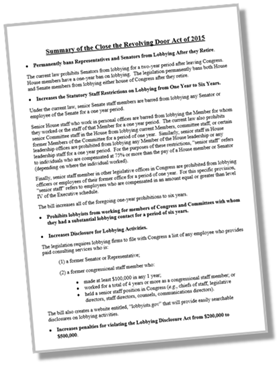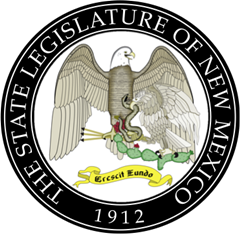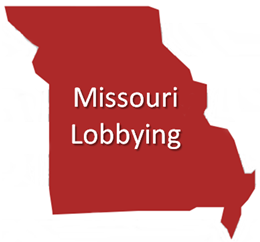May 25, 2016 •
Wednesday Government Relations News
Lobbying Missouri: “Impact of Missouri’s ‘Revolving Door’ Lobbyist Law Questioned” by Jason Hancock for Kansas City Star Campaign Finance “Despite Recommendations, FEC Won’t Pursue Charges that Murray Energy Coerced Campaign Donations from Employees” by Sabrina Eaton for Cleveland Plain Dealer […]
 Lobbying
Lobbying
Missouri: “Impact of Missouri’s ‘Revolving Door’ Lobbyist Law Questioned” by Jason Hancock for Kansas City Star
Campaign Finance
“Despite Recommendations, FEC Won’t Pursue Charges that Murray Energy Coerced Campaign Donations from Employees” by Sabrina Eaton for Cleveland Plain Dealer
“NRA to Pay $15,000 for Breaking State Campaign-Finance Rules” by Joseph O’Sullivan for Seattle Times
Virginia: “Officials: Federal prosecutors investigating Virginia Gov. McAuliffe” by Matt Zapotosky for Washington Post
Ethics
“Facebook Says an Investigation Found No Evidence of Bias in a News App” by Mike Isaac for New York Times
“NFL Tried to Influence ‘Unrestricted’ Research Gift, Congressional Report Says” by Rick Maese for Washington Post
Massachusetts: “Legislature Poised to Pass Public Records Measure” by Joshua Miller for Boston Globe
Elections
“Getting a Photo ID So You Can Vote Is Easy. Unless You’re Poor, Black, Latino or Elderly.” by Sari Horwitz for Washington Post
“Democrats Are Gay, Republicans Are Rich: Our stereotypes of political parties are amazingly wrong” by John Sides for Washington Post
“Reeling from 2016 Chaos, G.O.P. Mulls Overhaul of Primaries” by Jeremy Peters for New York Times
May 9, 2016 •
Missouri Governor Signs Ethics Legislation
Missouri Gov. Jay Nixon signed two ethics bills on Friday, May 6. One bill creates a revolving door provision for lawmakers and statewide elected officials seeking to become lobbyists. They must wait at least six months after their terms end […]
 Missouri Gov. Jay Nixon signed two ethics bills on Friday, May 6.
Missouri Gov. Jay Nixon signed two ethics bills on Friday, May 6.
One bill creates a revolving door provision for lawmakers and statewide elected officials seeking to become lobbyists. They must wait at least six months after their terms end before engaging in lobbying. The second bill requires candidates to dissolve their campaign committees and either refund or donate the remaining funds upon registering as lobbyists.
Both bills are effective August 28, 2016.
April 14, 2016 •
Portland, Oregon Reviews Proposed Ethics Reforms
The City Council heard two proposed ethics reforms at yesterday’s council meeting. An ordinance introduced to require political consultants working with Portland politicians to meet certain reporting and registration requirements was passed by the council and will go to a […]
 The City Council heard two proposed ethics reforms at yesterday’s council meeting. An ordinance introduced to require political consultants working with Portland politicians to meet certain reporting and registration requirements was passed by the council and will go to a second reading at next week’s meeting following some minor amendments.
The City Council heard two proposed ethics reforms at yesterday’s council meeting. An ordinance introduced to require political consultants working with Portland politicians to meet certain reporting and registration requirements was passed by the council and will go to a second reading at next week’s meeting following some minor amendments.
The other ordinance introduced to broaden revolving door prohibitions and close a loophole in registration requirements was not viewed as favorably by the council. The council will reconsider this ordinance at the May 11, 2016 council meeting.
Photo of Portland by Eric Baetscher in Wikimedia Commons.
A revolving door ban, prohibiting legislators from serving in office one day and returning as lobbyists the next, has been a priority for the Missouri General Assembly as it considers sweeping ethics reform legislation. The House passed a bill earlier […]
 A revolving door ban, prohibiting legislators from serving in office one day and returning as lobbyists the next, has been a priority for the Missouri General Assembly as it considers sweeping ethics reform legislation.
A revolving door ban, prohibiting legislators from serving in office one day and returning as lobbyists the next, has been a priority for the Missouri General Assembly as it considers sweeping ethics reform legislation.
The House passed a bill earlier in the year barring lawmakers from lobbying for one year after leaving office. The Senate removed the waiting period and wanted legislators to simply finish their respective terms before becoming lobbyists.
After months of deliberation and negotiation, a conference committee reached an agreement Wednesday both sides are likely to approve. The compromise would prohibit legislators from working as paid lobbyists for six months after their terms expire.
If both houses approve the committee’s recommendations, the bill will be sent to Gov. Jay Nixon for final approval.
Photo of the Missouri State Capitol by Nickbigd on Wikimedia Commons.
April 6, 2016 •
Portland, Oregon to Consider Ethics Reforms
The Portland City Council will consider adopting new ethics reform measures to broaden the revolving door prohibition to two years, and increase the penalties associated with repeated ethics violations. The proposal would also close a loophole in registration requirements, requiring […]
 The Portland City Council will consider adopting new ethics reform measures to broaden the revolving door prohibition to two years, and increase the penalties associated with repeated ethics violations. The proposal would also close a loophole in registration requirements, requiring lobbying entities that spend more than $1,000 a quarter on lobbying activities to register.
The Portland City Council will consider adopting new ethics reform measures to broaden the revolving door prohibition to two years, and increase the penalties associated with repeated ethics violations. The proposal would also close a loophole in registration requirements, requiring lobbying entities that spend more than $1,000 a quarter on lobbying activities to register.
A separate ordinance requiring political consultants working with Portland politicians to meet certain reporting and registration requirements will also be considered.
The new ordinances will be introduced at the council meeting on April 13, 2016.
March 21, 2016 •
Proposed State Ballot Initiative Includes Revolving Door Provision for Ohio Legislators
Attorney General Mike DeWine recently approved language for a proposed ethics amendment to the Ohio Constitution. The proposal includes a revolving door provision, including a two-year ban on former legislators doing business with the Legislature. The issue must be reviewed […]
 Attorney General Mike DeWine recently approved language for a proposed ethics amendment to the Ohio Constitution. The proposal includes a revolving door provision, including a two-year ban on former legislators doing business with the Legislature.
Attorney General Mike DeWine recently approved language for a proposed ethics amendment to the Ohio Constitution. The proposal includes a revolving door provision, including a two-year ban on former legislators doing business with the Legislature.
The issue must be reviewed by the Ohio Ballot Board to determine how it should appear on the ballot. Supporters of the amendment must gather at least 305,591 signatures of registered Ohio voters in order to reach the fall ballot.
January 13, 2016 •
Ethics Bills Pass Missouri House Committee
Four ethics bills have passed out of the House Government Oversight and Accountability Committee and now move to consideration by the entire House. These bills include banning statewide elected officials or legislators from working as political consultants while in office, […]
 Four ethics bills have passed out of the House Government Oversight and Accountability Committee and now move to consideration by the entire House.
Four ethics bills have passed out of the House Government Oversight and Accountability Committee and now move to consideration by the entire House.
These bills include banning statewide elected officials or legislators from working as political consultants while in office, creating a “cooling off” period of at least a full legislative session before elected officials or officials in jobs subject to Senate confirmation may work as lobbyists, requiring public officials to file semiannual reports detailing their personal finances, and reporting any out-of-state travel for official business when paid for by a third party.
Rep. Gina Mitten questioned the effectiveness of the revolving door bill during the committee hearing, asking if the cooling off period was long enough. She advocated having the measure cover legislative staff, requiring elected officials who leave office early to be prohibited from acting as lobbyists until the end of the term, and making the measure become effective as quickly as possible.
Hearings for bills regulating how to handle surplus campaign funds once an official leaves office and the banning of gifts from lobbyists have been delayed due to issues with the drafting of the bills. The committee will take those bills up next week.
Photo of the Missouri Capitol courtesy of RebelAt on Wikimedia Commons.
December 4, 2015 •
Missouri Legislator Pre-files Ethics Reform Package
State Rep. Caleb Rowden pre-filed a four-point ethics reform package this week, hoping to increase accountability and transparency in government. The first change would prohibit gifts from lobbyists to any state or local elected officials as well as to their […]
 State Rep. Caleb Rowden pre-filed a four-point ethics reform package this week, hoping to increase accountability and transparency in government. The first change would prohibit gifts from lobbyists to any state or local elected officials as well as to their families and staff members.
State Rep. Caleb Rowden pre-filed a four-point ethics reform package this week, hoping to increase accountability and transparency in government. The first change would prohibit gifts from lobbyists to any state or local elected officials as well as to their families and staff members.
The second change would institute a revolving door provision for state legislators and statewide elected officials up for election during the presidential campaign cycle. Such individuals would be barred from lobbying for one session after leaving office beginning in 2016. Elected officials up for election during the midterm elections would be barred from lobbying for one session after leaving office beginning in 2018. After 2018, the revolving door rule would apply to all state elected officials.
A third change would prohibit individuals with open candidate committees from registering as lobbyists.
The final proposed change would require elected officials to publically disclose travel expenses paid for by a third party within 30 days of receipt or within 30 days of the trip, whichever is sooner.
Speaker of the House Todd Richardson has vowed to make ethics reform a top priority when the session begins in January.
Photo of the Missouri State Capitol by RebelAt on Wikimedia Commons.
September 24, 2015 •
South Dakota Attorney General Explains Potential 2016 Ballot Measure
South Dakota Attorney General Marty Jackley recently released a statement describing a ballot measure to create a publicly funded campaign finance program. The program would allocate monetary credits to voters who could assign them to candidates. The measure would also […]
 South Dakota Attorney General Marty Jackley recently released a statement describing a ballot measure to create a publicly funded campaign finance program. The program would allocate monetary credits to voters who could assign them to candidates.
South Dakota Attorney General Marty Jackley recently released a statement describing a ballot measure to create a publicly funded campaign finance program. The program would allocate monetary credits to voters who could assign them to candidates.
The measure would also lower political contribution limits and create a revolving door provision for certain state officials seeking to become lobbyists. Said officials would be banned from lobbying for two years after leaving office.
Supporters must collect nearly 14,000 signatures to get the measure on the 2016 ballot.
September 1, 2015 •
Hillary Clinton Supports Financial Services Conflict of Interest Act
On August 31, in a column on the Huffingtonpost.com, Hillary Clinton announced her support for a bill to limit the revolving door between the financial sector and the federal government. In the post, Clinton and Sen. Tammy Baldwin, the sponsor […]
 On August 31, in a column on the Huffingtonpost.com, Hillary Clinton announced her support for a bill to limit the revolving door between the financial sector and the federal government.
On August 31, in a column on the Huffingtonpost.com, Hillary Clinton announced her support for a bill to limit the revolving door between the financial sector and the federal government.
In the post, Clinton and Sen. Tammy Baldwin, the sponsor of the bill, specifically emphasized the bill would prohibit private sector employers from offering bonuses to employees when they leave to join the government.
House Resolution 3065, the Financial Services Conflict of Interest Act, also increases the prohibition on lobbying the federal government from one to two years, expands the definition of lobbying contact to include any lobbying activities and strategy, and requires senior financial service regulators to recuse themselves from any official actions directly or substantially benefiting the former employers or clients for whom they worked in the previous two years before joining federal service. The press release for the bill can be found here.
Photo of Hillary Clinton by Hillary for Iowa on Wikimedia Commons.
A new bill entered in the U.S. Senate would permanently ban members of both houses of Congress from ever becoming lobbyists. The legislation was introduced on August 5 by Sens. Michael Bennet and Al Franken. The Senate bill, entitled the […]
 A new bill entered in the U.S. Senate would permanently ban members of both houses of Congress from ever becoming lobbyists. The legislation was introduced on August 5 by Sens. Michael Bennet and Al Franken.
A new bill entered in the U.S. Senate would permanently ban members of both houses of Congress from ever becoming lobbyists. The legislation was introduced on August 5 by Sens. Michael Bennet and Al Franken.
The Senate bill, entitled the Close the Revolving Door Act of 2015, additionally increases certain lobbying bans for senior Senate and House staff members from one year to six years after leaving the job. Another change the bill would implement is requiring lobbying firms to disclose paid consultant services by any employee who is a former senator or representative and certain former congressional staffers who made at least $100,000 in any one year, worked for four or more years as a staff member, or held a senior staff position in Congress. The bill also increases the maximum penalty for violating the Lobbying Disclosure Act, bans lobbyists from joining congressional staffs or committee staffs that they lobbied for six years, and creates a website to provide searchable disclosures on lobbying activities.
“The revolving door between Congress and the lobbying industry is a problem that needs fixing, because our democracy can’t function the way it’s supposed to when big interests have more power than the American people,” Franken said in a press release.
February 17, 2015 •
New Mexico Revolving Door Bill Advances
A bill to extend revolving door prohibitions has been recommended by a unanimous vote in the House Government, Elections, and Indian Affairs Committee. House Bill 241 prohibits former statewide elected officials, public regulation commissioners, legislators, and cabinet secretaries from accepting […]
 A bill to extend revolving door prohibitions has been recommended by a unanimous vote in the House Government, Elections, and Indian Affairs Committee. House Bill 241 prohibits former statewide elected officials, public regulation commissioners, legislators, and cabinet secretaries from accepting compensation as lobbyists for a period of two years after leaving public service.
A bill to extend revolving door prohibitions has been recommended by a unanimous vote in the House Government, Elections, and Indian Affairs Committee. House Bill 241 prohibits former statewide elected officials, public regulation commissioners, legislators, and cabinet secretaries from accepting compensation as lobbyists for a period of two years after leaving public service.
The bill is expected to pass the House, but will likely face opposition in the Senate.
Last year, a similar proposal cleared the House 43-23, but the Senate Rules Committee failed to advance the mirror version of the bill.
January 30, 2015 •
Legislation to Implement Lobbyist Revolving Door Policy Gaining Momentum in Missouri Senate
A bill creating a revolving door for lawmakers seeking to lobby after leaving office was approved by the Senate Rules, Joint Rules, Resolutions, and Ethics Committee by a 7-0 vote. The bill requires state lawmakers to wait two years after […]
 A bill creating a revolving door for lawmakers seeking to lobby after leaving office was approved by the Senate Rules, Joint Rules, Resolutions, and Ethics Committee by a 7-0 vote.
A bill creating a revolving door for lawmakers seeking to lobby after leaving office was approved by the Senate Rules, Joint Rules, Resolutions, and Ethics Committee by a 7-0 vote.
The bill requires state lawmakers to wait two years after leaving office before working as lobbyists. It also bans out-of-state travel paid by lobbyists and limits when a lobbyist can report spending on a group of legislators instead of on individual members.
If passed, the bill would have an effective date of January 2017.
January 12, 2015 •
WA Legislature Considers Revolving Door Ban
A new ethics bill scheduled to be proposed in the Washington Legislature would impose a revolving door ban on state legislators, statewide elected officials, and directors of cabinet-level agencies. The proposal was developed by Attorney General Bob Ferguson and Rep. […]
 A new ethics bill scheduled to be proposed in the Washington Legislature would impose a revolving door ban on state legislators, statewide elected officials, and directors of cabinet-level agencies.
A new ethics bill scheduled to be proposed in the Washington Legislature would impose a revolving door ban on state legislators, statewide elected officials, and directors of cabinet-level agencies.
The proposal was developed by Attorney General Bob Ferguson and Rep. Reuven Carlyle, D-Seattle.
The bill would impose a “cooling off” period, where said officials could not lobby state government for one year after leaving office.
Photo of the Washington State Capitol by Nicopoley on Wikimedia Commons.
State and Federal Communications, Inc. provides research and consulting services for government relations professionals on lobbying laws, procurement lobbying laws, political contribution laws in the United States and Canada. Learn more by visiting stateandfed.com.


